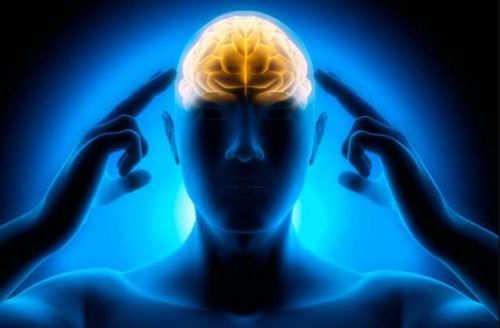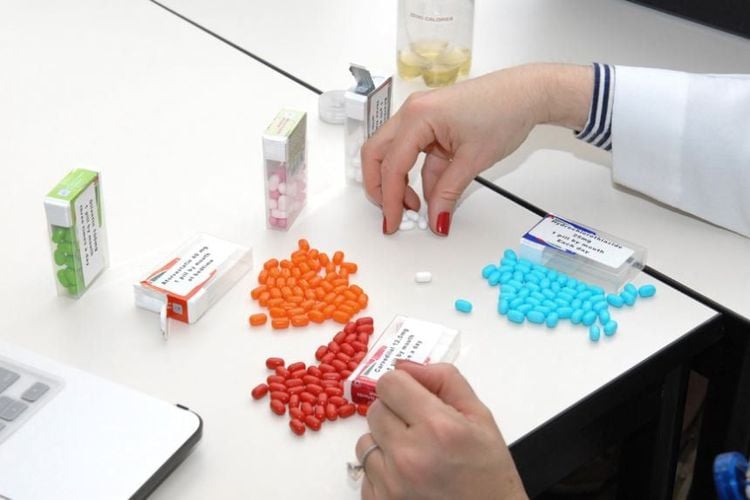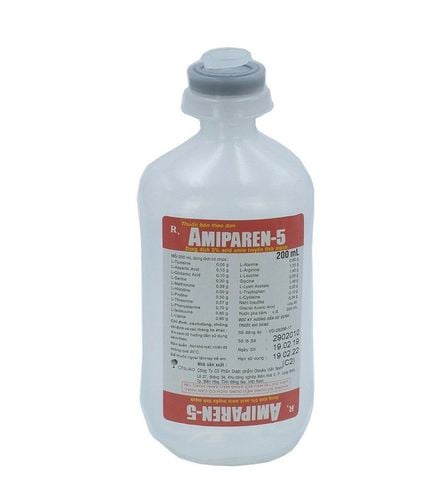This is an automatically translated article.
L-theanine is a naturally occurring compound found in green and black tea, and it's also available in supplement form. Research shows that L-theanine has the potential to provide a range of health benefits, including improved mental focus and better sleep quality. The article below provides an overview of L-theanine, including its health benefits, potential risks, and dosage.
What is L-theanine?
L - theanine is an amino acid . The human body does not produce this compound and it is not needed by humans. Green tea, black tea, and some mushrooms naturally contain L-theanine. L-theanine may also affect the levels and concentrations of certain chemicals in the brain. These include serotonin and dopamine, which affect mood, sleep, and emotions, and cortisol, which helps your body deal with stress. The altered balance of these chemicals can alter a person's mood or stress levels. Small animal studies and tests have shown that L-theanine can provide many benefits. Experts say it is generally safe, but there are currently not many high-quality human studies to confirm its benefits.
Why do people take theanine?
Some early research has shown that supplementing with theanine can help people feel more relaxed and reduce anxiety. Theanine supplements helped boys with attention deficit hyperactivity disorder (ADHD) sleep better in one small study. Another small study found that when combined with caffeine, theanine may help improve thinking. More research is needed to see how theanine affects these conditions. One study found that green tea drinkers - which are high in theanine - had a lower risk of stroke.
Several animal and laboratory studies suggest that theanine may help treat dementia, high blood pressure, and unhealthy cholesterol levels. Theanine may also increase the benefits - and reduce side effects - of some cancer drugs. But we still don't know if theanine supplements offer these benefits in humans. Standard dosages of theanine have not been established for any of these conditions. The ingredients in supplements can vary widely. This makes it very difficult to establish a standard dosage.
2. The benefits of L-theanine
2.1. Increases mental focus Many people drink black or green tea while working, believing it enhances their mental focus. A 2012 study strongly supports this hypothesis. The researchers found that those who took 100 milligrams (mg) of L-theanine made fewer errors on attention tasks than those in the placebo group. Taking 50 mg of caffeine or a combination of L-theanine and caffeine also improved people's focus.
More research is needed to determine how L - theanine can affect a person's attention and focus.

L-theanine giúp cơ thể tăng khả năng tập trung tinh thần
2.2. Improving sleep L-theanine may help people fall asleep more easily. Several studies have suggested that: L-theanine may also help people relax before bed, fall asleep easier, and sleep more deeply. These benefits may be due to amino acids' specific effects on brain chemicals that play a role in sleep.
A 2018 study found that people reported feeling more satisfied with sleep after taking 450 – 900 mg L-theanine daily for 8 weeks. Study participants had generalized anxiety disorder and were taking antidepressants. The authors note that there were no reports of improvement in anxiety severity or insomnia.
2.3. Relax People often drink a cup of tea or other hot beverage to help them relax. Research shows that the L-theanine found in green or black tea may contribute to this feeling of relaxation by reducing a person's resting heart rate.
2.4. Increased cognitive performance In 2016, researchers reviewed existing research on the benefits of L-theanine and concluded that the compound could benefit a person's mental and physical health. . They note that it also appears to have a neuroprotective effect, helping to improve brain function. L-theanine alone can improve a person's attention and reaction times. Combined with caffeine, it has the potential to lead to improvements in their number skills and alertness. Caffeine is a stimulant, so it can help people stay alert and focused. However, not all studies have found that L-theanine can improve cognitive performance in people. More high-quality studies are needed to clarify the effects of this compound on human mental functions.
2.5. Weight loss As part of a calorie-controlled diet, replacing a snack with green tea or another low-calorie hot beverage can help with weight loss. The L-theanine in green tea can produce a salty taste, known as umami. Recently conducted studies suggest that umami flavor can reduce appetite, which often helps with weight loss.
2.6. Strengthening the immune system L - theanine can help your body fight disease. Some studies have suggested that taking L-theanine might boost a person's immune system, making them less susceptible to the common cold or flu.
2.7. Lowers blood pressure Research has linked high blood pressure with a higher risk of several health problems, including heart attack and stroke. L-theanine can help reduce stress and promote relaxation which can lower heart rate. In turn, this can help lower blood pressure.
2.8. Help with certain cancer drugs Some animal studies suggest that L-theanine may increase the effectiveness of a chemotherapy drug called doxorubicin. It is possible that it makes doxorubicin more effective by increasing the amount of drug in the cancer cells. However, scientists need to do more research to understand the specific interactions between these chemicals.

L-theanine tăng hiệu quả của một loại thuốc điều trị ung thư
3. The risks and side effects of L-theanine
There are no confirmed or direct side effects of consuming L - theanine. In general, drinking tea and taking supplements containing L-theanine is safe. But it's important to note that the Food and Drug Administration (FDA) does not regulate dietary supplements. The manufacturers of such products are responsible for making sure their products are safe.
However, although some studies show promising results for L-theanine's anti-tumor properties, teas containing the amino acid may have other ingredients that are harmful to people undergoing cancer treatment. letters.
According to Memorial Sloan Kettering Cancer Center, the polyphenol EGCG found in green tea may decrease the effectiveness of some chemotherapy drugs, such as bortezomib. For that reason, it's important for people taking chemotherapy drugs to talk to their healthcare provider before drinking green tea as part of their treatment plan.
Although there are no reports of side effects when taking L - theanine, because of the caffeine content, consuming large amounts of green tea can lead to:
Nausea Stomach upset Irritability Pregnant or breastfeeding women Breastfeeding children should also limit tea to avoid containing too much caffeine. It is best to talk to our doctors or experts about what is safe for us. The same advice applies to children.
Although there is some evidence that L-theanine can benefit people's mental and physical health, more research is needed before doctors can be sure of its effects. actual use of this compound. Scientists have yet to conduct high-quality studies in humans. Many of the studies to date have had small sample sizes, which means very few people were involved in the study. Data from only a small number of people is less likely to be conclusive than data from larger groups. Other studies have used animals, such as rats or mice. However, humans may react differently from animals, so these results may not be applicable.
After taking advice from experts, the US Food and Drug Administration has classified L - theanine as "generally recognized as safe". This classification means they believe the additive will be safe when people use it as the packaging suggests. However, women who are pregnant or breastfeeding should not use L-theanine.
L - theanine is an amino acid found mainly in green and black tea and some mushrooms. It is also available in tablet form. It is said to help relieve anxiety, stress, and relieve insomnia. Experts consider L-theanine generally safe for people to use as a supplement, but more research is needed to confirm its possible health benefits. Small studies and animal studies suggest that L-theanine may promote relaxation, improve sleep quality, and provide neuroprotection.
Please dial HOTLINE for more information or register for an appointment HERE. Download MyVinmec app to make appointments faster and to manage your bookings easily.
References: medicalnewstoday.com, webmd.com, healthline.com












